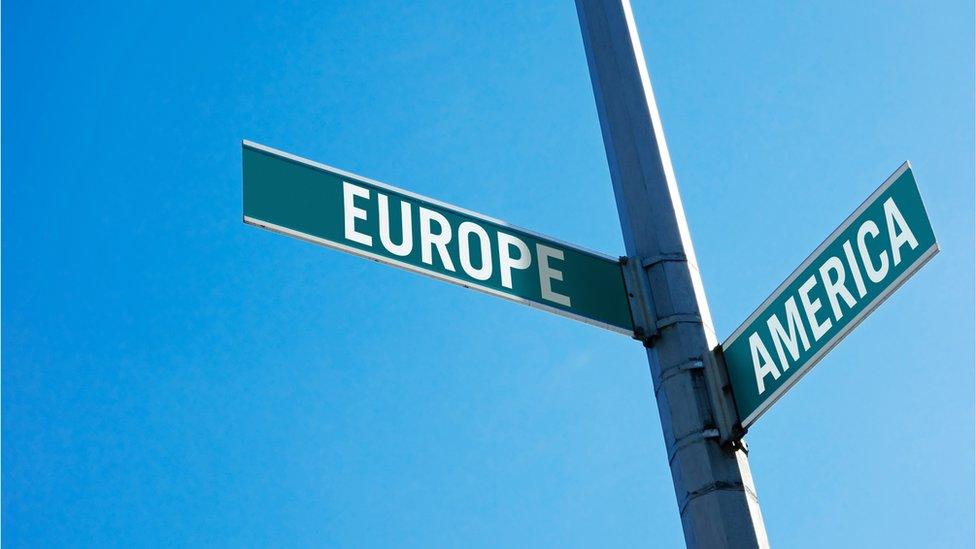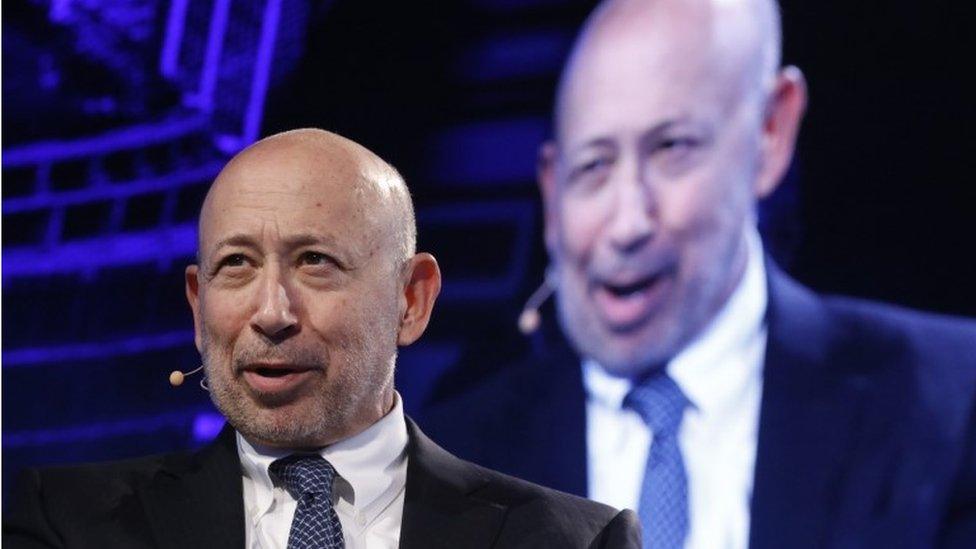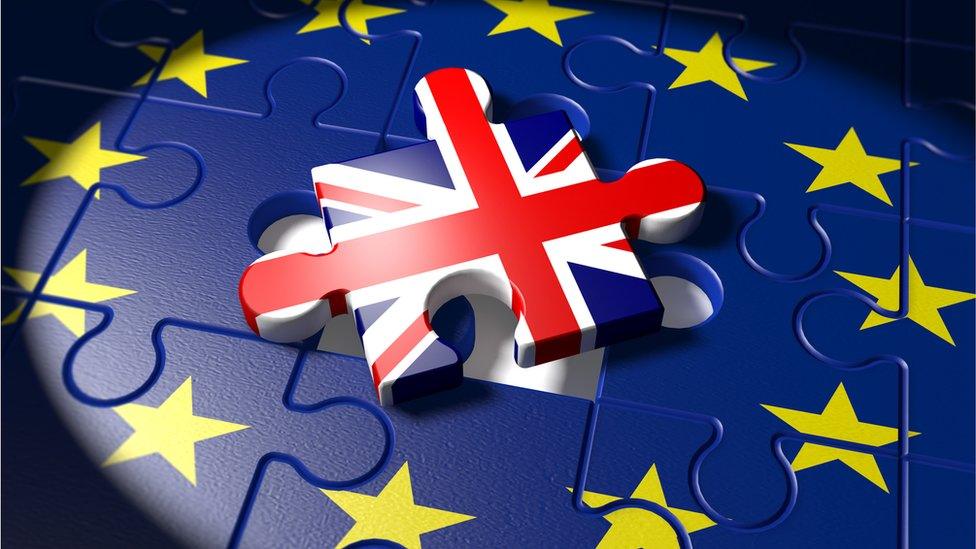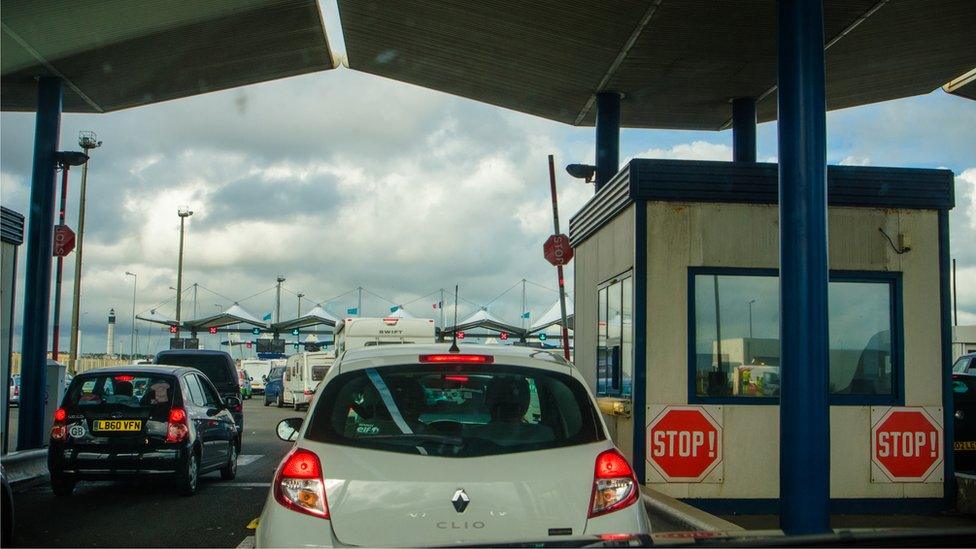Brexit viewed from Brussels (3): Uncle Sam gets nervous
- Published

The voice of business is getting louder and more querulous on the subject of Brexit. We've heard of finance firms, including Royal Bank of Scotland and Standard Life Aberdeen, preparing to shift workers out of Britain to be within the European Union in future.
Goldman Sachs' boss tweeted that he expected to spend longer in Frankfurt in the near future.
This week, some of the big business lobby groups got together to demand a faster pace to talks, and more certainty on what they could expect.
The Scottish government last week highlighted some of the companies and sectors that have raised their concerns about trading after Britain leaves the European Union.
After the delay in concluding stage one of the divorce talks, Karen Briggs, head of Brexit at KPMG, offered this observation: "No business wants to commit to major investment decisions whilst uncertainty remains over whether more progress might now be made in December.
"Consequently we're seeing businesses quietly stockpiling inventory and exploring alternative sources of talent, whilst nervously pushing bigger financial decisions into the new year.

Lloyd Blankfein said he expected to spend more time in Frankfurt
"The exception is in financial services where the big houses are already investing in the most cost effective ways to be Brexit-ready.
"Here the conversation has moved on from high level analysis and impact plans, to much more detailed work on setting up an EU presence and the very human issues associated with moving people overseas."
CityUK, which represents the financial sector, said the summit outcome was "disappointing, unnecessary and damaging" for the UK and EU.
It confirms that members have their foot on the accelerator towards shifting workers out of Britain, and with no transition deal clear, it may be getting too late to pull back: "While still hoping for the best, businesses are planning for the worst."
'Who do we phone?'
Among the voices from outside Europe that have a strong influence within it are American-based multi-national companies. And they haven't been shy about having their voice heard.
They stand to lose from a messy Brexit. And as they're all concerned with trade, and with the single market, American corporate investors in Europe are all saying pretty much the same thing. So I went to hear what the American Chambers of Commerce has to say.

Its concerns have been boiled down to three Ts: transition, trade and talent. That's wholly aligned with the concerns expressed from every other business group.
But while some can sound a bit vague (they want as little change as possible, and as easy a cross-border flow of workers) the Americans add quite a bit of interesting detail to their pitch.
Now, you might think that a lot of Americans would be more than happy to see Europe fracture. It has been a big counterweight to America's economic dominance.
Decisions made in Brussels can be quite tough on America's big corporates, particularly around tax and market dominance.
Microsoft, Apple, Amazon and Boeing are among those to have big problems with European Union rulings and regulation.
And there's often American criticism of how bureaucratic the EU can be, or lacking in leadership ("who do we phone?"), or protective of its own industries and farmers (not that free market America would think of doing that).
Bridgehead
But the big corporates who have already established themselves in Europe love the single market. They've invested heavily so that they can exploit its potential.
It's almost as if it were designed for them. The critics and cynics say that's precisely the problem.
Europe has been ideal for globalising multi-nationals. It hasn't been so good for worker rights and social cohesion, however much European institutions have tried to soften the blow.

Because Britain and Ireland are familiar, in language and legal systems, that's where much of the FDI, or foreign direct investment goes from America, as a sort of bridgehead into the wider EU market.
The Irish have done particularly well, helped by that 12.5% corporation tax rate. In 1982, it had $2.8bn worth of sales by US affiliates or subsidiaries - 13th biggest of countries receiving US investment. By 1990, that was up to $9.5bn, and 11th biggest.
A decade on from that, and the Bureau of Economic Analysis showed US affiliates in Ireland selling $1.1bn, in seventh place, and by 2014, it was on £285bn and in second place.
Medicines later
In the first three of these surveys, the UK was top ranked in the world. By 2014, it was fourth, after Singapore, Ireland and Switzerland, selling $195bn.
But that's still a big player in American eyes, far bigger in FDI (foreign direct investment) than France or Germany. US subsidiaries in Britain are reckoned to employ 1.4m people. In 2016, 60% of US FDI went to the European Union. Of that, quarter went to the UK.
But wouldn't they prefer a trade deal between the UK and US, as Donald Trump would, and the British government - something tailor-made to US and UK priorities? Well, no, says Chamber boss Susan Danger (an Englishwoman who is now a Belgian national).
While wanting things to stay as close as possible to the way they are, here are some of the specifics that the American Chamber of Commerce (AmCham) in Brussels has put forward:
What if the UK post-Brexit wants different environmental regulations for its manufactured products? Its market is seen by AmCham as simply too small for international companies to produce specifically for British environmental norms. They say Britain should accept European rules on that.
Likewise, if Britain wants to go its own way in regulating medicines and medical devices. There's a blunt warning that it'll become a second tier market after the US, EU and Japan, so UK patients would get access to medicines later than others. (Don't worry. It seems highly unlikely that Britain would want to go its own way, but it will have to replicate European testing, or simply accept European or US regulatory decisions, having lost the medicines agency from London.)
They're concerned about Britain having a different system for handling company takeovers. At the moment, they're either handled in London or Brussels, but not both. Would they need clearance in both in future, at considerably more expense to the companies?

The Americans, including some big business services firms, say they're looking to a lot of legal work shifting out of Britain, if the courts in Britain can no longer apply European business law. A lawyer trained and qualified for the English or Scottish courts may no longer be recognised as being able to handle European law.
If Britain uses its freedom to subsidise some industries - known in Brussels as state aid - that might look attractive to companies winning those funds. It's one of the things that attracts the Corbynistas about being out of the EU. But what if they are then blocked from trading with the EU because they break state aid rules?
And in financial services, there's a warning of real economic impact if London is blocked from funding firms across Europe. If that funding source becomes harder to access, the impact could be felt widely. In other words, that could be felt more widely across Europe than in the UK.
There is concern about hold-ups at ports between the EU and UK. Figures from the Port of Dover are cited that suggest there's an average two-minute process for trucks carrying goods between countries in the single market. But if they're carrying goods between the EU and an external country, that goes up between 10 and 40-fold.
Consumer laws have been ridiculed or reviled in Britain as much too interfering and unreasonable for business. They included directives on unfair selling and unfair terms, consumer goods guarantees, misleading and comparative advertising, injunctions for consumer safety, e-commerce and consumer privacy. The advice from AmCham members: keep all the directives, with their high level of protection, and don't complicate matters.
So much for free market Americans, and what the French contemptuously call the British and US 'Anglo-Saxon model'.